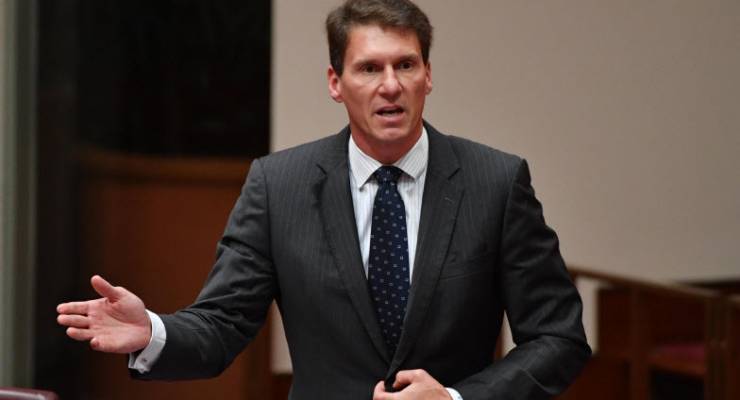
The political marriage between Family First and Cory Bernardi’s Australian Conservatives will find no disputes on social policy, but it might run into hurdles over the size of government.
Bernardi today announced the merger of the two parties, which will give the South Australian senator a leg up in his home state with two upper house members in South Australia’s state Parliament, and all the associated infrastructure for Family First — including the Kent Town offices that led to Bob Day’s resignation from the Senate and the High Court case that resulted in the election of his successor, soon-to-be independent Senator Lucy Gichuhi.
Bernardi said in a press conference today that the joining of the two conservative parties was a natural union, but there are policy differences between the two. While former senator Bob Day voted with the government more than 80% of the time (and with Bernardi 81% of the time), Family First itself does — at least in principle — have some differences with Cory Bernardi’s Australian Conservatives.
Australian Conservatives’ website doesn’t quite have policies set out, opting instead for principles guiding how the party operates. That includes limited government, personal responsibility, free enterprise and civil society.
For the most part, that appears to align with Family First’s values, such as they are (including, for some reason, the right to get your hair done). On social issues, Family First and Australian Conservatives will align — opposed to same-sex marriage, opposed to Safe Schools, and all the religious freedom in the world. Where they might run into trouble is the size of government.
Family First’s policy on government — aside from the odd statement that “anything not based on economic reality is doomed to failure” — suggests heavy government investment in infrastructure, including telecommunications. This would seem to be at odds with the Australian Conservatives’ smaller government stance.
Former Family First senator Steve Fielding was also one of the key proponents of the former Labor government’s internet filtering proposal, and the party’s policy page on “family” still calls for a ban on pornography and a ban on all alcohol advertising and only allowing G-rated ads. Where would the free speech warrior Cory Bernardi stand on this amount of censorship?
How the two are balanced will probably end up being irrelevant. The church party will be medium-sized but not a broad church. Immigration Minister Peter Dutton has suggested that Day was the father of the Family First party. Day’s departure from the political scene, and Bernardi taking over as the leader of the new merged entity, will mean he has more sway over the policies of the party — not to mention voting power as their sole federal political representation.
However, Bernardi in his press conference today said the party was more about conservative values than any one particular policy or person elected into Parliament.








But what are they going to call the new party?
I’d like to suggest ‘Bernadi First’ which is both a hat-tip to their origins, and a statement of philosophy.
Or maybe Family Bernadi?
Not at all like Sly & the Family Stone nor the Sister Sledge hit.
Given that William Bowe notes that Family First, [which] emerged early last decade out of Adelaide’s vigorous Pentecostal community and that Cory Bernardi is an altRight Roman Catholic it doesn’t at first gloss appear to be a marriage made in heaven. How long can it last?
Gordon… hopefully not very long!!!
There goes the Family First cover? …. ‘You have to be the right family’?
Also I imagine their keenness on religious freedom requires you to be “the right religion”.
“They’re creepy and they’re kooky,
Mysterious and spooky,
They’re all together ooky,
The Bernardi Family….”
Uncle Fester and Lurch …. to the far-right.
The original cast of characters didn’t include one as unsettling as Cory.
It’s kind of funny that Family Thirst, the party that reversed the tax on Alchopops, want a ban on all alcohol advertising.
I don’t think conflicting ideologies are a problem here. You have to have an ideology that you are willing to stick to and not be able to be “lobbied” to do the opposite for it to be a problem.